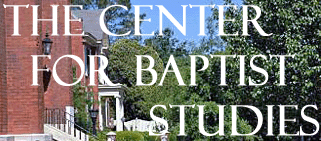|
Encouraging scholarship, strengthening faith identity, and interpreting contemporary issues in Baptist life. |
|||
 |
|
Baptist Freedom |
|
|
Home • Staff • Local Church • News & Views • Issues • Bulletin • Conferences / Seminars • Sabbaticals • Certificate • Links |
|||
|
by Dr. Bruce Prescott & Dr. Rick McClatchy Southern Baptist Reconfigurations In 1979 a group led by Paul Pressler and Paige Patterson formed a political coalition that was determined to change the Southern Baptist Convention (SBC). The changes they wrought increased the authority of the pastor over the congregation, reduced seminary education to indoctrination, required rigid doctrinal conformity, elevated the Bible above Christ, worked to tear down the wall of separation between church and state, and subjected women to the authority of men in the church and the home. Many Southern Baptists were opposed to this agenda. In spite of sharp opposition, the Pressler-Patterson coalition was able to garner about a 55% vote convention meetings throughout the 1980's. 1990 marked the beginning of the most significant reconfigurations in Southern Baptist history. Cooperative Baptist Fellowship After the June 1990 SBC meeting in New Orleans, Daniel Vestal, then pastor of the Dunwoody Baptist Church in Atlanta, led a meeting of more than 3,000 traditional Southern Baptists who were opposed the agenda of the Pressler-Patterson coalition. They discussed ways of building a network of relationships while designating contributions to those SBC causes that they could continue to conscientiously support. Those assembled formed a new funding mechanism, called the Baptist Cooperative Mission Program. It secured a voice for traditional Baptists within the SBC by channeling funds to select SBC causes and it preserved organizations that were being defunded by the SBC -- the Baptist Joint Committee and the International Baptist Seminary in Ruschlikon, Switzerland. In May 1991 traditional Southern Baptists met again in Atlanta and adopted a name, the Cooperative Baptist Fellowship (CBF), a constitution, a budget, and a ministry plan that would launch bold new initiatives in theological education and missions. By 1994 the SBC was tired of the voice of traditional Baptists and refused to accept funds from CBF. Part of the SBC's weariness stemmed from the stature of the voices that were dissenting. A few months after Keith Parks retired as president of the SBC's Foreign Mission Board, he joined CBF's staff as head of its global missions program. At CBF, Parks implemented a global missions program that focused upon people groups who have had little access to the gospel. His plan was to supplement rather than duplicate the efforts of the SBC's Foreign Mission Board. CBF sends its missionaries to the most difficult areas and dangerous places -- places where missionaries do not normally go. CBF commissioned its first missionaries in 1992. Since that time the program has expanded to support more than 140 missionaries. CBF works with other organizations and institutions in a partnership arrangement without controlling them or owning them. Among CBF partners are a dozen seminaries, a publishing house, a news service, two Christian ethics groups, and a religious liberty lobby in Washington D.C. CBF has a foundation and an annuity/insurance program for churches. CBF also provides church resources, leadership training events, and reference services for churches seeking ministers. CBF has grown steadily. In 1991 it received 4.5 million from 390 churches, and by 2001 it grown to 1800 churches with a budget near 17 million with approximately 60% committed to global missions. Also, CBF receives funds directly from individuals who are members of churches that refuse to send funds to CBF. State CBF organizations have grown and several have elected state coordinators. State CBF organizations have started local mission works, developed university student ministries, provided leadership-training events, and assisted new church starts. Most churches involved with CBF continue to have some involvement with the old Southern Baptists' structures (national, state, and local association). However, in recent years an increasing number of churches have lessened their involvement the national SBC and some have completely disassociated themselves from the national SBC. It is clear that many involved in the CBF have given up on the SBC and wish to chart a new direction free from the impact of the Pressler-Patterson agenda. The Mainstream Network In the 1990s groups emerged in several states to try and stop the Pressler-Patterson agenda from impacting the state conventions. The sentiment was that the national SBC was lost, but that some of the state conventions and Baptist universities, which are connected with the state conventions, might be saved. These traditional Southern Baptists gave varied names to their organizations. Some called themselves Baptists Committed, others Mainstream Baptists, and others formed Baptist Heritage Councils. The purpose of these various groups is to inform and mobilize the Baptist laity. They work to educate Southern Baptists about their heritage and distinctive beliefs and empower them to resist the spread of Pressler-Patterson agenda in their state conventions, associations, and local churches. Mainstream networks in Texas and Virginia were successful in halting the takeover of their state conventions. Both state conventions have begun charting a route independent of the SBC and each has become a target of vicious attack by SBC leaders. Consequently, separate state conventions have been formed in Virginia and Texas that are sympathetic to the Pressler-Patterson agenda. Nonetheless, most Baptist churches in those states have refused to join these new Pressler-Patterson state conventions. Most state conventions are in the midst of a struggle to determine the future of their state conventions -- Alabama, Arkansas, Illinois, Kentucky, Louisiana, Mississippi, South Carolina, North Carolina, and Tennessee. Several state conventions are completely under the control of the Pressler-Patterson coalition -- Florida, Georgia, Missouri, New Mexico, and Oklahoma. In these states the struggle continues in the associations and individual churches. A national Network of Mainstream Baptists was recently formed to aid these efforts. Some Baptist universities have altered their relationships with their state conventions in order to prevent a possible takeover by the Pressler-Patterson coalition -- Baylor (TX), Carson-Newman (TN), Furman (SC), Grand Canyon (AZ), Mercer (GA), Ouachita (AR) Samford (AL) Stetson (FL), and Wake Forest (NC). Other Baptist universities are watching developments closely and may follow suit. American Baptists Some Southern Baptist churches are building bridges with the American Baptists. (Southern Baptists separated from American Baptist in 1845 because American Baptists wouldn't condone slavery.) The fragmentation of the SBC has opened up new dialogue between traditional Southern Baptists and American Baptists, which may prove fruitful for future joint efforts and mission endeavors. Future Baptist Configurations The SBC will never look like it did prior to the Pressler-Patterson takeover. Many Baptist churches will reduce or end their involvement with the SBC. More state conventions will alter their relationship with the SBC and more states with have two state conventions competing for the loyalties of Baptists. More Baptist universities will become autonomous. The state conventions and universities opposed to the Pressler-Patterson agenda are showing interest in entering partnerships with CBF. CBF is building bridges and entering partnerships with American Baptists, conventions of African-American Baptists, and others that share traditional Baptist convictions and beliefs. It is too soon to tell if any new Baptist denomination will emerge that will be able to combine all these Baptist churches and groups under one organizational umbrella. A more likely scenario is that these various Baptist bodies will increasingly communicate and work together on projects of mutual concern. Baptist individuals and churches that are opposed to the Pressler-Patterson agenda are struggling to fund the new cooperative partnerships that they have created. Traditional Baptists are increasingly deciding that, in good conscience, they can only fund institutions and organizations that share their beliefs and work to preserve their core values. As a matter of good stewardship many Baptists are asking their churches to permit them to designate that the portion of their tithes and offerings that once supported the SBC be given to CBF or one of the Mainstream organizations. Others have begun to support these organizations by direct financial contributions.
Go to Baptist Pamphlets Index
|
|||
|
The Center for Baptist Studies, Mercer University, 1400 Coleman Avenue, Macon, GA 31207 Phone (478) 301-5457 |
|||
